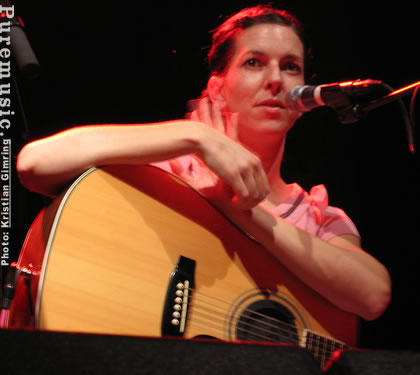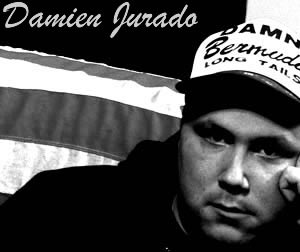
A Conversation with Rosie Thomas
(continued)
PM: What was the occasion that turned Sub Pop on to you?
RT: It was Damien Jurado. We had become really good friends, really by accident. I was singing in this band called Velour 100 in Michigan for a year. And I'd been in California before then. I went home for about a year. I took a break, saving money, basically, to figure out whether it was either New York or Seattle that would be the next place for me to go. And this band Velour 100, this friend of mine told me they were looking for a vocalist. I thought, while I'm here that'd be kind of fun, to audition. If they liked me at least it would be a fun thing to do while I was home. So I auditioned for them, and they said, "Yeah, we really want you to sing for us." So we went on our first tour that October. And I said, "So who are we touring with?" And they said, "We're touring with Damien Jurado and this band called Pedro the Lion. I said, "Okay." I was kind of a hippie then. I had all my homemade clothes on. I said, "Pedro the Lion, are they like a Rastafarian band? If they are, I'm going to love them." They were like, "No, Rosie."
So we got to the show, and it was Damien and Dave Bazan and all those guys. And I was just really on the verge of: "Am I going to Seattle or not?" And I had no clue where these guys were from. And I said, "So where do you live?" They said, "We live in Seattle, you should move there." And I just took that as a sign. I was like, "I can't believe all of you are from Seattle."
Damien had this big thing at the time, he wanted everybody to move to Seattle. He was like, "There's no other city." So he sold me on it. We toured for about a week, and then I fell in love with them, and they were so nice to me. They said, "Rosie, come on tour with us, now that you're done with your tour, just come with us. Just hang out in the van with us, like drive with us for a week or so until you need to go home." And so I did.
PM: Wow.
RT: I just got in the van with them, and I went on maybe a week or so more, and then I took a bus home from New York, I think. And I almost lost my job over there, but it was worth it. But basically after that I decided it would be Seattle. So here I'd been about to move to a city where I wouldn't have known anybody, and I ended up moving to a city where I already had a handful of great friends.
PM: So do those guys, Bazan and Jurado, still live in Seattle?
RT: Yep, they still do. They're loyal Seattleites, for sure. Yeah, they're all still here. When I first moved here I actually lived in the house that Pedro the Lion lived in. I stayed with them throughout the summer. So it was Damien, it was that Ghost of David record--
PM: Right.
RT: --first year at school, right, that I came out here. He said, "Why don't you come by, and I want you to sing on my songs." I said, "Okay." I thought I was just going to put some harmonies on them. I remember he said, "All right, I'm going to play the song for you until you get the melody down." I said, "All right. But I'm just going to harmonize, right?" He said, "No, you're going to sing the melody." And he just left the room.
And I was like, "All right." So I sang it by myself, and he left it that way, which I thought was very--
PM: Ah, it's just a solo vocal. See, I got to go back and hear that song.
RT: Yeah, it was just me by myself, and that was it. That was what he wanted. And it was a very interesting idea for him to do that. And then once he turned the record in to Sub Pop they started inquiring about, "Who's your friend Rosie?" And he said, "She's a singer songwriter." When I moved to Seattle, he and I would take these drives in his Volvo, and he would say, "All right, Rosie, what is it you want to do?" And I'm like, "You know what I want to do, dude, I want to entertain people. I want to do this for a living." He was like, "I'm going to help you." It's funny, he really did. It was that record. I would have never thought that would--when I sang that song that day in his house, I didn't think that was going to lead to anything. I just thought it was a really fun opportunity for me to be with my friend.
PM: Yeah, just one of those experiences you had no idea was going to kick a door open.
RT: Oh, no way. No way.
PM: That it was going to kick the door open.
RT: Yeah, for sure. But I mean, to think that Sub Pop would be interested in a hippie type singer/songwriter that sings all this sort of folk pop...I mean, Damien was one of the first sort of singer/songwriter type folk artists that they really had on their label. There was no way I ever would have thought--
PM: Yeah, because it was a pop label, right.
RT: Yeah. It's not like I came to Seattle thinking Sub Pop Records was going to--it wasn't even a thought in my mind. I just enjoyed playing shows for the sake of performing. That was big enough for me at the time.

PM: So maybe before we're done you'll give me Damien's email, because I tried to send him one, and it popped back to me, because I kind of came on to him through researching you, and when I looked into his career a little bit, as soon as I realized that he had a song called "I Break Chairs," I just sat down and wrote a letter to him.
[laughter]
PM: It says, "Damien, if you wrote 'I Break Chairs,' I want to interview you."
RT: He will make you laugh your ass off. He's a funny man.
PM: That's just unbelievable, "I Break Chairs."
RT: I think if you do an interview with him, you'd have to ask him, but if I remember correctly I think it's because he literally was sitting somewhere one day and the chair broke beneath him.
PM: Oh! He breaks chairs like that. Well, that's even funnier.
[laughter]
RT: And he completely centered a record around that. But you'd have to double check with him on that, but I believe that that's where that came from. continue
print (pdf) listen to clips puremusic home